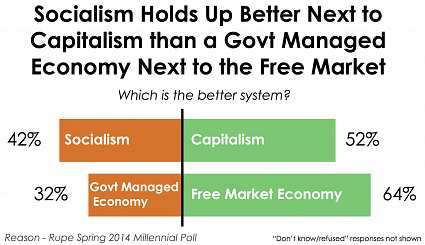Millennials Hate Capitalism Almost as Much as They Hate Socialism
Seize the means of production? Meh. Millennials love private enterprise-as long as you don't call it "capitalism."


It was all over my Facebook news feed yesterday: "A majority of millennials now reject capitalism, poll shows." Libertarian friends shook their heads in scorn or lament while the socialists gloated or posed some variation on, "well can you blame them?" But just like the last half-dozen surveys on millennial economic philosophy, this new poll finds young people torn between "capitalism" and "socialism," with perhaps little—or, to be more charitable, an ahistorical—understanding of what either means.
The Washington Post piece people were sharing starts off with a dramatic statement: millennials are rejecting "the basic principles of the U.S. economy." The base for that claim? A new poll of 18- to 29-year-olds, conducted by Harvard University. Researchers found just 42 percent say they support capitalism, while 51 percent do not.
But twenty-somethings aren't exactly clamoring for the government to seize the means of production, either. Just 33 percent said they support socialism, while 59 percent said they do not.
"The results of the survey are difficult to interpret," writes the Post's Max Ehrenfreund. Not really. In a recent survey question about feminism, 53 percent of young women said they would not label themselves a feminist, but only a third of this group said it was because they're at odds with feminist goals; nearly half just took issue with the term feminism. A 2014 poll from the Public Religion Research Institute found 65 percent of millennials say the term pro-life describes them "at least somewhat well," while 74 percent say the same for "pro-choice." These seeming contradictions lie in the fact that words—especially big, emotionally-laden words describing controversial or complicated concepts—connote different things to different people.
When pollsters probe young people further about socialism and capitalism, they tend to find that respondents don't have clear concepts of these economic philosophies. To many millennials, "socialism" doesn't mean a government-managed economy but something like what we have now, only with more subsidized health care, student-loan forgiveness, and mandatory paid parental leave. Millennials were small children, if they were even born yet, when the Soviet Union dissolved. "Socialism" isn't Romania and Yugoslavia but Scandinavia, not Karl Marx and union halls but Bernie Sanders and Twitter.
"Capitalism," meanwhile, doesn't simply mean private, for-profit enterprise. It isn't a category that has anything to do with the family-owned bodega on their corner or their friend's new artisanal cupcake business or the proliferation of legal weed shops, with Tom's shoes or their local grocery or that Uber they took last night. Capitalism is Big Banks, Wall Street, "income inequality," greed. It's wealthy sociopaths screwing over the little guy, Bernie Madoff, and horrifying sweatshops in China. It's Walmart putting mom-and-pop stores out of business, McDonald's making people fat, BP oil spills, banks pushing sub-prime mortgages, and Pfizer driving up drug prices while cancer patients die. However incomplete or caricatured, these are the narratives of capitalism that millennials have grown up with.
Takeaways for fans for free enterprise?

We need to do a better job marketing capitalism, probably. We certainly need to consider whether and how the word can be reclaimed, or if we're better served talking about the "market economy," "private enterprise," "free trade," or "entrepreneurship." Millennials love the word entrepreneur, with some surveys finding that more than half of young folks aspire toward entrepreneurship.
Millennials also love the idea of "social entrepreneurship"—doing well in business while doing good for others. Unlike anti-capitalists of yore, young people today don't seem to see a tension between turning a profit and living righteously. It's just a matter of making that money in an ethical manner, and "giving back" in some way, be it by donating a portion of proceeds or creating a product or service that provides a social good. (For more on all this, see my 2014 Reason feature, "Rise of the Hipster Capitalist.")
As John Della Volpe, polling director at Harvard, puts it, millennials aren't "rejecting the concept" of capitalism. "The way in which capitalism is practiced, in the minds of young people—that's what they're rejecting."
The Reason-Rupe Millennial Poll, a national survey of 18- to 29-year-olds undertaken in 2014, found 56 percent of respondents had a favorable view of capitalism, making it slightly less popular than socialism, which was viewed favorably by 58 percent. Asked about "free markets" and a "government managed economy," however, markets won big time. Only 28 percent of those surveyed saw socialized business positively, compared to 74 percent who view free markets positively. What's more, 64 percent said they prefer free markets to a gov-managed economy, while only 32 percent said the opposite.
"Young people like free markets and the technology, products, and wealth [capitalism] creates," wrote pollster Emily Ekins, "but they also want to feel confident the poor have access to what they need. In their minds socialism might simply connote a social safety net rather than government ownership."
In the new Harvard poll, economic-policy preferences were pretty evenly split between those who want more government intervention and those who want less, with large numbers of respondents unsure what course of action they preferred. Nearly half had no opinion on whether "our country's goal in trade policy should be to eliminate all barriers to trade and employment so that we have a truly global economy." Some 27 percent said it should, while 24 percent said it should not.
More respondents agreed that "cutting taxes is an effective way to increase economic growth" (35 percent) than disagreed with this statement (22 percent). Thirty-eight percent neither agreed nor disagreed.
Ultimately, only 27 percent of millennials in the Harvard poll said they think the federal government should play a "large" role in regulating the economy, while 42 percent prefer it play a "moderate" role, 18 percent a "minimal" role, and 9 percent "no role" at all. The breakdown was similar for regulating Wall Street, with 30 percent wanting Uncle Sam to play a large role, 37 percent a moderate role, and 28 percent a minimal or no role.


Show Comments (222)